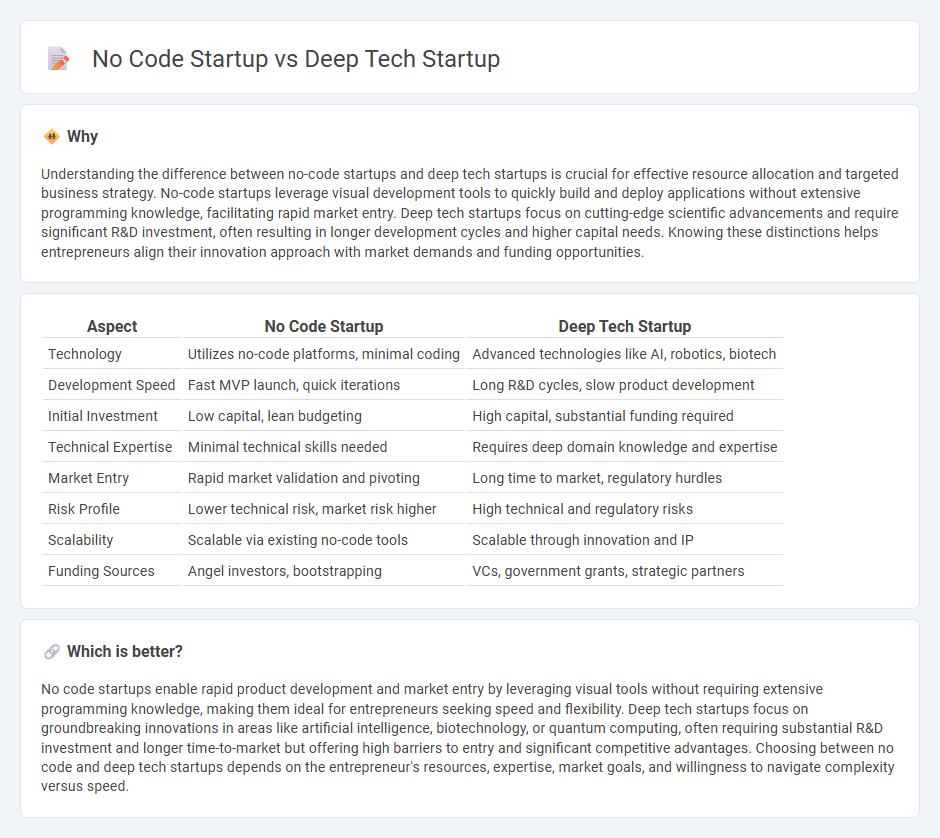
No-code startups leverage visual development platforms to build software solutions rapidly without extensive programming knowledge, enabling faster market entry and reduced initial costs. Deep tech startups focus on breakthrough innovations in fields like artificial intelligence, quantum computing, or biotechnology, requiring significant research and high capital investment. Explore the unique advantages and challenges of each to determine the best entrepreneurial path.
Why it is important
Understanding the difference between no-code startups and deep tech startups is crucial for effective resource allocation and targeted business strategy. No-code startups leverage visual development tools to quickly build and deploy applications without extensive programming knowledge, facilitating rapid market entry. Deep tech startups focus on cutting-edge scientific advancements and require significant R&D investment, often resulting in longer development cycles and higher capital needs. Knowing these distinctions helps entrepreneurs align their innovation approach with market demands and funding opportunities.
Comparison Table
| Aspect | No Code Startup | Deep Tech Startup |
|---|---|---|
| Technology | Utilizes no-code platforms, minimal coding | Advanced technologies like AI, robotics, biotech |
| Development Speed | Fast MVP launch, quick iterations | Long R&D cycles, slow product development |
| Initial Investment | Low capital, lean budgeting | High capital, substantial funding required |
| Technical Expertise | Minimal technical skills needed | Requires deep domain knowledge and expertise |
| Market Entry | Rapid market validation and pivoting | Long time to market, regulatory hurdles |
| Risk Profile | Lower technical risk, market risk higher | High technical and regulatory risks |
| Scalability | Scalable via existing no-code tools | Scalable through innovation and IP |
| Funding Sources | Angel investors, bootstrapping | VCs, government grants, strategic partners |
Which is better?
No code startups enable rapid product development and market entry by leveraging visual tools without requiring extensive programming knowledge, making them ideal for entrepreneurs seeking speed and flexibility. Deep tech startups focus on groundbreaking innovations in areas like artificial intelligence, biotechnology, or quantum computing, often requiring substantial R&D investment and longer time-to-market but offering high barriers to entry and significant competitive advantages. Choosing between no code and deep tech startups depends on the entrepreneur's resources, expertise, market goals, and willingness to navigate complexity versus speed.
Connection
No code startups accelerate product development by enabling rapid prototyping and iterative testing without extensive coding, which complements deep tech startups focused on advanced research and complex technological innovations. Deep tech startups benefit from no code tools to streamline initial market validation and user experience design, reducing time-to-market and resource expenditure. This synergy fosters entrepreneurial agility, combining deep scientific breakthroughs with scalable, user-friendly applications.
Key Terms
**Deep tech startup:**
Deep tech startups leverage advanced scientific research and cutting-edge technologies such as artificial intelligence, quantum computing, and biotechnology to solve complex problems with long-term potential. These startups often require extensive R&D investments, specialized expertise, and longer development cycles compared to no code startups that prioritize rapid product development and ease of use. Discover more about the unique challenges and growth opportunities within deep tech ventures.
Intellectual Property (IP)
Deep tech startups prioritize developing proprietary technologies and complex research outcomes, consistently securing patents and trade secrets to protect their Intellectual Property (IP) against competitors. No code startups focus on rapid application deployment with flexible platforms, often relying on user experience and customization rather than extensive IP portfolios for competitive advantage. Explore how IP strategies differ between these startup models to optimize innovation protection and business growth.
Research and Development (R&D)
Deep tech startups prioritize intensive Research and Development (R&D) to create groundbreaking technologies such as AI algorithms, quantum computing, or advanced biotechnology. No code startups focus less on traditional R&D and more on developing user-friendly platforms that enable non-technical users to build software through visual interfaces. Explore the key differences in R&D approaches to understand how each startup type drives innovation.
Source and External Links
Imec.DeepTechVentures: supporting deep-tech start-ups and investors - Deep tech startups develop innovations based on advanced scientific and engineering breakthroughs that address high technology risks and transform sectors such as health, energy, and space, requiring specialized infrastructure and funding to bring disruptive solutions to market.
Deep Tech: The New Wave - IADB Publications - Deep tech startups are grounded in scientific discoveries or engineering innovations with significant technological risk but have the potential to create new industries and address global challenges, with growing ecosystems especially in Latin America and the Caribbean valued at billions of dollars.
What Is Deep Tech? | Built In - Deep tech refers to companies leveraging advanced scientific principles and engineering, often in fields like AI, biotechnology, and quantum computing, to develop disruptive products that push boundaries beyond mainstream technology.
 dowidth.com
dowidth.com